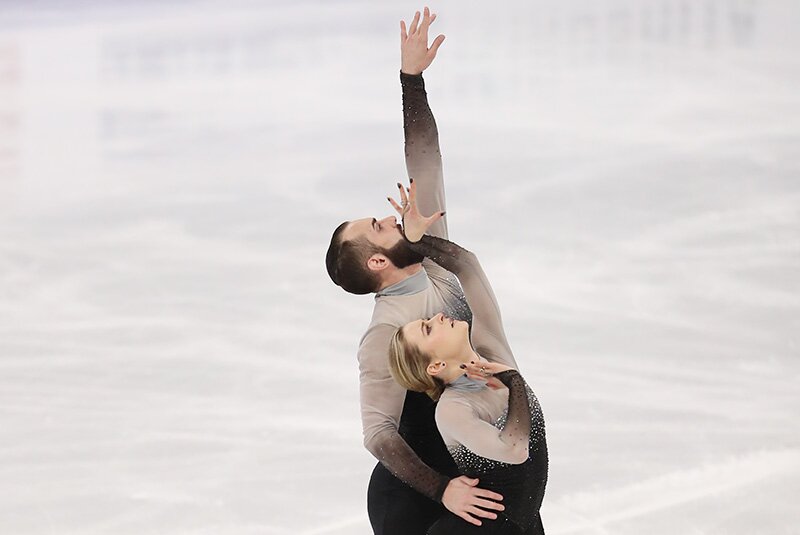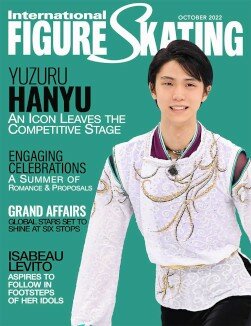

They were not expecting too many opportunities to come their way during the 2020-2021 season. In a year when few expected any major competitions to take place, and with many convinced the season would be canceled entirely, Ashley Cain-Gribble and Timothy LeDuc, like so many other skaters, remained hopeful that would not be the case. That positive mindset laid the foundation for how their season would ultimately play out.
Despite the uncertainty of whether or not a skating season would take place in any form in the 2020-2021 campaign, Ashley Cain-Gribble and Timothy LeDuc continued to train and stay in shape as if it was business as usual. With only a short closure of their training facility in Euless, Texas, they were in a more fortunate position than many others in that they were able to continue working without interruption throughout 2020.
The American duo kicked off their season with a fourth-place finish at Skate America in late October, missing the podium by just 0.42 of a point. Three months later they captured bronze at the U.S. Championships — their first national medal in two seasons since winning the title in 2019 — but both felt the performance was a personal victory in itself.
“For us, it felt like a huge win coming off the ice, just feeling like Ashley and Timothy. It’s been a long time since we felt that way,” said Cain-Gribble, 25. “We felt like numerous times we were looking at ourselves from the outside, but this time I felt we were fully engaged in the performance and every piece of the choreography. We gave it everything we had. We chose not to stand in our way and just let ourselves skate freely. I think that showed us what we are capable of, so it was a win in that sense.”
With only two places available for U.S. pairs at the World Championships in Stockholm, Sweden, Cain-Gribble and LeDuc were the first alternates. Rather than taking a break, the duo returned to their training regimen. That ultimately proved to be a fortuitous decision.
“We figured that in a year like this where those Olympic spots were so important to get at the World Championships … and if there was ever a year to be prepared to go in as first alternates, it was this one,” Cain-Gribble explained. “So we did not take any time off. We went home and got back to work.”
To help keep them in the competitive mode, Russian coach Nina Mozer set up an online event and evaluated their programs. U.S. Figure Skating arranged mock competitions where they received feedback as well as scores for their performances. Both agreed that having a schedule with set dates kept them invested in what they were doing and gave them a focus to “train for something” as well as goals to work toward.
A month before the World Champion- ships were scheduled to take place, Cain-Gribble and LeDuc were notified that the 2021 U.S. silver medalists, Jessica Calalang and Brian Johnson, had withdrawn and they would be taking their place in Stockholm.
“We were not startled or freaking out or anything because we had been training as if we were going to Worlds,” LeDuc recalled. “We knew we were prepared and that if we did get called we would be ready to go. And if we didn’t, we had already put all that work in for next season. So once we got the news it made it official, but it did not change anything.”
Having experienced the bubble concept at their two previous competitions, Cain- Gribble and LeDuc arrived in Stockholm with a better understanding than most of how the event would be conducted. “Each time it got easier to go into the bubble because by the time Worlds came around it was our third competition and we were quite used to all of it,” Cain- Gribble explained. “Obviously, you are factoring in a lot more skaters, but it was not too shocking or overwhelming. It felt extremely safe.
“Precautions were taken leading up to the competition and during it to keep everyone safe. We all wanted a competition to be held so everyone followed the rules. Being back in a venue with skaters from other countries, you felt that buzz again, which was really exciting. And it was super exciting to see friends and competitors that we had not seen for over a year.
“For me, the biggest thing was travelling so far again as it had been over a year since we had been anywhere. Normally, we would be doing that every month or maybe twice a month and you get used to it, but I think the biggest factor was the jet lag for sure.
“Our trip was really short because the morning after our long program we flew out really early. So, you kind of felt like you arrived, you quarantined, you skated, and you left. It felt really quick, at least for the pairs, and you did not get to see a lot of people unless you were in the arena.”
With no audience, other than skaters, event officials and volunteers at any of the three events the team contested, LeDuc said that while he was “so grateful they held the World Championships and that we got to be part of it,” he missed having fans in the stands. “As far as excitement goes, we love an audience so not having one was hard. We are looking forward to hopefully having more opportunities to skate in front of an audience next season.”
“Skate America and U.S. nationals were held in a smaller arena in Las Vegas, and they blocked off a whole section, but in Stockholm, it was a huge arena and with no audience … I would say that it was a bit different,” Cain-Gribble added. “Luckily there were a few volunteers and other skaters that came to watch the event, so we at least got some live cheering which brought the energy level up a little bit.”
Skating 16th in a field of 24 in the short program, Cain-Gribble nailed the throw triple Lutz but fell on the side-by-side triple Salchows. They finished in sixth place. Errors on the side-by-side jumps in the long program proved costly and Cain- Gribble and LeDuc finished in ninth place overall. “We were a bit disappointed but, at the same time, very proud of some of the things we did,” said LeDuc, 31. “We missed some of the elements, in particular the triple loop on my part.
“In the short program, our levels were awesome, and we were really, really excited about that. There were some moments where we really shined and moments that things we normally do well got away from us that were costly. We need to continue to do what we do and keep working hard so that what we do in practice translates into competition. We feel that we could have been a little higher in the placement at Worlds but are happy that we got two spots for the U.S. for the Olympics for next year.”
When asked if nerves make the difference between what they do in practice and in competition, LeDuc said, “It can be, sometimes. For both of us, I think we try too hard and we start thinking. That can sometimes mess up the timing. So it is really all about staying in the moment and staying focused on the task rather than allowing other narrative or other things to come in and influence our performances.”
During the off-season, the team focused on what LeDuc believes they need to improve, such as program content, unison and emotion. “We are developing two programs right now that are really special, and we are putting the time into the detail of everything. It can be the least little thing that separates us from the podium and not the podium,” he said.
In late April, they turned to Pasquale Camerlengo for a new short program. A week later, they went to California to work on a new long program — set to music from the soundtrack of the 2019 film “The White Crow” — with Misha Ge.
RUSSIAN CONNECTION
Over the years, Cain-Gribble and LeDuc have developed a solid connection with Mozer, and have worked with her in many places in the world, including Russia and the U.S. That relationship began in 2017 following a trip to the World Team Trophy, where they had their first meeting with the renowned coach.
“Nina came to a U.S. pairs camp to work with all the teams a couple of weeks later, and it was arranged for her to work with us after that. Our energies and that of our coach really matched with hers at that camp and we all worked really well together,” Cain-Gribble recalled. “She told our coach that she hosted a three-week camp in a little town in the mountains in Italy every summer and we could take part in it if we wanted to.
“We went to the camp, and it was really intense. That was our first opportunity to work with her. Since then, we have either gone to Russia to work with her or we have met her somewhere in the world. Every year she comes to work with all the teams at the U.S. pairs camp. She has also accompanied us to competitions like the World Championships and nationals the year that we won.
“It has been a collaborative effort between her and our team and she has been a great addition. Not only have we learned so much from her, I think she has also learned a lot from working with a U.S. team that is a little more on the unique side with me being a bit taller. We have all learned a lot from each other.”
With international travel not an option in 2020, U.S. Figure Skating arranged two classes a week for the top three teams — Cain-Gribble and LeDuc, Alexa Knierim and Brandon Frazier, and Calalang and Johnson — via Zoom. “Every Tuesday and Thursday we had a one-hour lesson with Nina, and she worked with us every single week. We were really fortunate to have that. Our coach would follow us around with an iPad and show the video to Nina who would then give us feedback,” Cain- Gribble explained. “This year we are looking forward to being able to travel to where she is, or to have her come here to work with us.”
With the 2022 Olympic Winter Games just months away and only two berths for U.S. pairs in Beijing, the team is focused on doing everything they can to earn one of them. “We skate our best when we stay focused on our task, our job, our journey and our story,” said LeDuc. “It is really just going to be about maintaining that focus.
There are no plans to add any new elements to their programs for this season, but knowing what sets them apart and what makes them special and unique are the main areas they will focus on. “We practice and train really well and with the preparation we are doing right now, all the detailing in our programs and working on adding to all those long lines — those are all things that give us such an advantage that we are really excited to show this year. So it is just about putting that out in competition and staying focused on our task.”
“And overall, just being consistent throughout the season because nationals is not always the deciding factor,” Cain- Gribble added. “The selection is based on your entire season, so just taking every opportunity as it comes and getting the most out of it.”
Neither is looking too far ahead and the conversation about what lies beyond the 2022 campaign is for another day.“At this time we are just focusing on this season alone and once this one ends, just going off of that,” Cain-Gribble said. “We don’t want to think too far ahead just because it is such an important season, and we are trying to get the most out of it.”
But both are adamant they intend to remain connected to the sport when they do hang up their competitive skates.
Prior to teaming up with Cain-Gribble, LeDuc performed on cruise ships, something he said he loved. “I believe there are a lot of possibilities for us but right now we are just focused on doing everything right this season and we will figure all that out later. Skating will always be part of our lives.”
Cain-Gribble said coaching and choreography are on their list of possibilities as they currently do both with a lot of the children with whom they currently work. “I would love to have a pairs school at some point. That is one of my goals. I would love for that to happen. Being able to train with Nina and see how they bring a lot of those pairs skaters up through the schools in Russia is something I would want to apply if I had a pairs school.”
Looking back at last season — as abbreviated as it was — both expressed gratitude that they were able to continue doing what they love. “Last year was a really interesting one for everyone,” said LeDuc. “Our takeaways from the season as a whole? There is an overwhelming sense of being grateful that we got to have a season, got to move forward and grow as teammates with everything that was going on.
“We had a good Worlds and medaled at nationals. We did not get all the results we wanted, but even with disappointing results I think what we can take away is being really grateful that we had the opportunity to skate, to keep moving forward doing something we love and still have good results. A big highlight and something that was validating was being top six in the short program at the World Championships. That was really exciting for us. But really, the true highlight was just having the opportunity to compete, to be able to do something we love and to skate at a Grand Prix, nationals and Worlds — that was the highlight.”
“Some people were under the impression that it was going to be a season that never happened,” said Cain-Gribble. “So when we look back on it, we did accomplish a lot being in a worldwide pandemic.”
Cain-Gribble and LeDuc will open their 2021-2022 campaign at Autumn Classic International, which takes place Sep. 16-18 in Pierrefonds, Québec.
RELATED CONTENT:
20201 CHALLENGER SERIES




